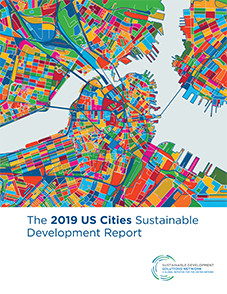More details
Forward
America’s cities are home to more than 80 percent of Americans and around 85 percent of US production. They will determine the future of sustainable development in the United States. Around the US, more and more cities are signing up to the Sustainable Development Goals framework for action. As one leading example, my own city, New York City, is guided by the plan OneNYC 2050. This comprehensive sustainable development plan, closely aligned with the SDGs, aims to achieve an equitable, sustainable city for all New Yorkers by the year 2050, including the transformation to zero greenhouse gas emissions by mid-century.
The 2019 US Cities Sustainable Development Report aims to help cities to calibrate their progress towards the SDGs. This report, produced annually since 2017, is a part of a global effort to measure performance of cities, nations, and companies relative to the SDGs underway at the UN Sustainable Development Solutions Network (SDSN). SDSN is grateful to many partner institutions for collaboration, brainstorming, and support to monitor the SDGs and implement programs for their achievement.
This year’s report highlights the many urgent challenges facing America’s cities. The data show substantial and rising inequalities of income, persistent poverty, unsafe physical environments, and of course, the continued emissions of greenhouse gases that contribute to human-induced climate change and that threaten humanity. These indicators should provide flashing red lights to communities around the US to take actions at the local level to promote the SDGs, and to advocate for sustainable development policies at the federal and state level as well.
The index also shows many cases of progress. We warmly congratulate the cities at the top of this year’s ranking for a job well done. For the cities lower down the list, we offer these rankings and indicators as guides, support, and a call to action. Sustainable development is not a choice or ideology. It is not on the left-right political spectrum. It is the very essence of our wellbeing and the kind of cities and nation that we will leave to future generations. We therefore offer this SDG City Index in the spirit of collegiality, and we at SDSN look forward to partnerships of the SDSN with cities across the United States in order to accelerate actions to achieve inclusive and sustainable cities for all Americans, and indeed throughout the world.
Jeffrey D. Sachs
Director, Sustainable Development Solutions Network
What is SDSN USA?
The Sustainable Development Solutions Network United States (SDSN USA) endeavors to build pathways for achievement of the UN’s Sustainable Development Goals in the United States by mobilizing research, outreach, and collective action.
The SDSN USA is a network of researchers, knowledge creators and thought leaders working together to mobilize expertise on the SDGs in the United States. Officially launched on December 4, 2018, the SDSN USA has over 120 members from 41 states, Puerto Rico, and Washington DC. It joins the existing Sustainable Development Solutions Network which spans six continents and draws upon the knowledge and educational capacity of over 1,000-member institutions. SDSN USA is co-chaired by Jeffrey Sachs at Columbia University, Dan Esty at Yale University, and Gordon McCord at the University of California, San Diego. The SDSN USA team is currently comprised of three staff.
If you have questions, please contact SDSN USA at usa@unsdsn.org.
Acknowledgements
The authors are very grateful for advice and feedback from several colleagues and partners. Thank you to Jess Espey who contributed an article to this report “Twin Approaches to the SDG Monitoring Challenge (p.7).” Thank you to Alejandra Ramirez and Erica Finfer for assistance in the production of this report. We would also like to thank Jessica Espey, Hayden Dahmm, Laurie Manderino, and the authors of the 2017 US Cities Sustainable Development Goals Index for their work and inspiration. In addition, we would like to acknowledge the guidance of Guillaume Lafortune and Guido Schmidt-Traub, and particular thanks to Professor Jeffrey Sachs who provided feedback and input throughout the process.
We would like to thank members and partners of the SDSN USA network for their advice, guidance and expertise while building this report: Helen Bond, Ph.D. Associate Professor, School of Education, Howard University; Austin L Brown, Ph.D., Executive Director, UC Davis Policy Institute for Energy, the Environment, and the Economy; and Carolyn M. Porta, PhD, Professor & Director of Global Health, School of Nursing, University of Minnesota.
The 2019 US Cities Sustainable Development Report compiles the data analyses and resources from many agencies, research centers, civil society organizations, and others. The authors would like to acknowledge and thank the researchers for their work and contributions that were used in producing this report. Thank you to Christopher Chini, University of Illinois at Urbana- Champaign, Caitlin Briere, US Environmental Protection Agency and Steve Devito, US Environmental Protection Agency for sharing their subject matter expertise with us. For a complete list of data sources, refer to the Annex.
